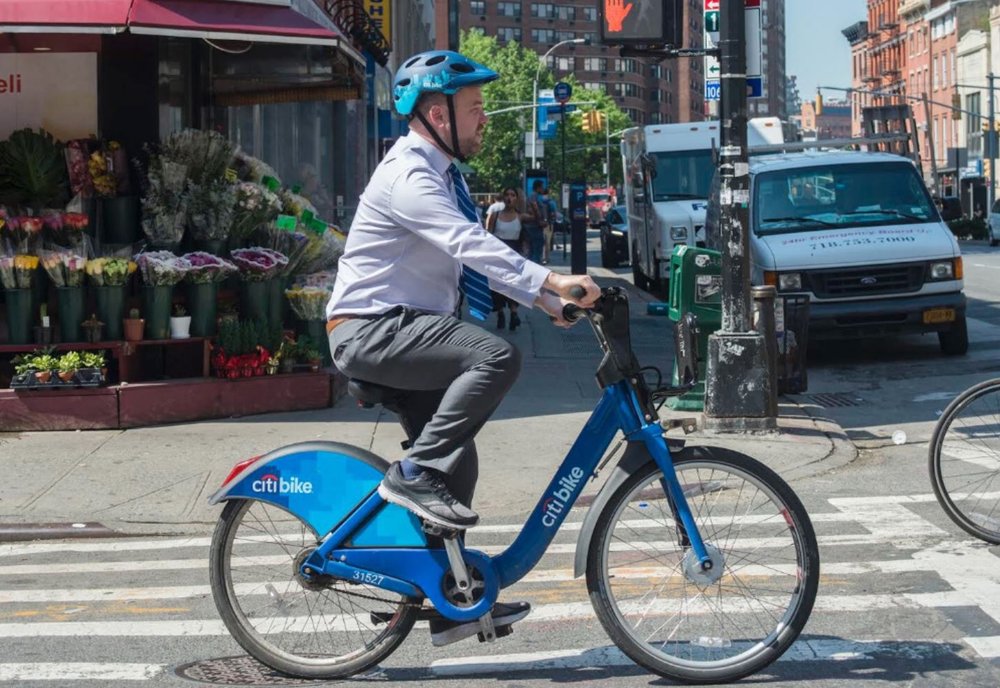Seeking more pricey, electric Citi Bikes, Lyft enlists connected lobbyist: ex-Council Speaker Corey Johnson
Feb. 9, 2023, 9:01 a.m.
During his tenure as the Council's speaker, Johnson championed legislation opposed by the e-hail company.

Lyft wants to boost the number of electric Citi Bikes on the streets, and it's enlisting help from a source close to City Hall: former City Council Speaker Corey Johnson.
Lyft is paying the firm run by Johnson – who while in office championed legislation the e-hail company opposed – $12,500 per month to lobby the transportation department, city records show. But critics say the effort to raise the cap on the percentage of e-bikes in the system’s fleet is a Trojan horse for higher fares.
“It [raising the cap] also means much more pricing control over the system for Lyft without city oversight, and there are big equity implications there,” Jon Orcutt, policy director at Bike New York, told Gothamist. “I think if we're gonna see this big policy change that's gonna tilt the pricing control of the system to Lyft, the public should know about it. And DOT should be asked what they're gonna get for it.”
Unlike with pedal-powered Citi Bikes, Lyft is permitted through its contract with the city to raise the price of its e-bikes at any time. The e-bike prices are already much more expensive: Riders pay an extra 26 cents per minute to ride them — or 17 cents a minute if they pay a $205 annual fee for a Citi Bike membership.
When the e-bikes first launched in 2020, Lyft charged 10 cents a minute for members, and 15 cents for nonmembers.
Lyft has roughly 27,100 Citi Bikes in its network, but Department of Transportation regulations allow for the pricier, more popular and easier to ride e-bikes to comprise only 20% of the fleet. The company wants that cap expanded as the network moves further into the boroughs.
In November, Lyft hired Johnson — whose City Council term expired last year — as a lobbyist to negotiate with the city over “micro-mobility regulations,” city records show. Sources in the transportation department with knowledge of Johnson’s lobbying effort said he’s focused on expanding the e-bike cap.
His company — CoJo Strategies — is paying another firm, JMG Strategies, $5,000 a month to help with the lobbying effort, public records show.
It’s a new role for Johnson, who succeeded in halting the growth of Lyft and Uber e-hail vehicles on city streets in 2018, when he was City Council speaker. At the time, he lamented that officials should have acted quicker to slow the growth of the companies as they deployed more than 80,000 cars onto the streets.
Johnson also works as a lobbyist for other high-profile clients with business before the city, including Vornado Realty, Northwell Health and the Central Park Conservancy.
He’s entered his new line of work as the City Council seeks to clamp down on former city employees taking lobbying jobs soon after leaving their public positions. A bill proposed last month would require a two-year moratorium on the type of lobbying work Johnson is performing for Lyft. Currently, a two-year lobbying ban only applies to former city commissioners and deputy mayors.
Johnson — who in 2020 was expected to run for mayor before launching a failed bid for city comptroller — did not respond to multiple requests for comment on this story. Officials from Lyft and the transportation department declined to comment.
Orcutt, of Bike New York, fears Lyft will raise Citi Bike prices as it did recently in Chicago, which has a slightly different system from New York, with different charges based on zones. In that city, e-bike riders saw a surprising and sharp increase in some rates.
Last year, Lyft hiked nonmember fares for e-bikes and scooters in Chicago’s Divvy bike system from 20 cents per minute to 39 cents per minute, and also added a new $2 fee to park them in some locations.
In New York, Lyft increased annual Citi Bike membership by $20 and raised the rate for a 30 minute nonmember ride by 50 cents in January — the second straight year it hiked prices.
Still, the Manhattan and Brooklyn borough presidents have for months called to increase the 20% cap on e-bikes.
Lyft notes that it offers $5 monthly memberships to people living in NYCHA units or who receive SNAP benefits, which offer a discounted 6 cents per minute fee for e-bike rides. Roughly 15,000 people have signed up for the discount program, and 60% of their rides are on e-bikes, according to Lyft. That compares to 180,000 people who pay the $205 annual membership fee, who Lyft says make up 77% of Citi Bike’s ridership.
Elizabeth Adams, a senior director at the advocacy group Transportation Alternatives, said the e-bikes are good for riders, but wants the city to negotiate with Lyft to keep them affordable.
"As more New Yorkers turn to bikes, we must make it as easy and affordable as possible for them to do so,” said Adams. "Reducing car usage is key to reaching our climate goals, and electric bikes have been proven to replace car trips while making biking more accessible to New Yorkers."